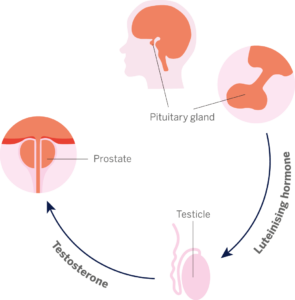Hormone therapy
How does hormone therapy work?
To grow, the prostate cancer cells need the male hormone testosterone. Hormone treatments work in different ways to prevent testosterone stimulating the prostate cancer cells. The LHRH agonists and GnRH antagonists will prevent testosterone from being produced by the testicles and are given as an injection. The anti-androgens block the action of testosterone on the prostate cancer cells and are given as tablets. They are both effective in treating this stage of prostate cancer but have different side effects.
You may receive hormone therapy on its own or in combination with other treatments, such as radiotherapy.
It is important to know that many people will experience emotional as well as physical side effects while on hormone therapy. Many men on hormone therapy have less energy and feel less motivated, and you may also experience changes in your mood, such as feeling more sentimental, more irritable or more tearful than usual. This is nothing to be ashamed of.

What are the risks and side effects of anti-androgen drug therapy?
These drugs allow some men to maintain their sex drive and sexual activity and do not cause any reduction in bone strength, which can be a side effect of LHRH agonists and GnRH antagonists. In some men, the drugs cause loss of body hair, the breasts to grow and sore nipples.
LHRH agonist injections or GnRH antagonists
These drugs stop the release of a hormone that sends signals to the testicles to produce testosterone. It is a roundabout way of switching off testosterone and so helps to stop prostate cancer from growing.
The first injection is usually given at the hospital, but further injections can be given by your GP. The injections are repeated every month or every three months, according to the recommendations of your doctor.
What are the risks and side effects of hormone-manipulation drug therapy?
- You will be unable to have an erection, lose your sex drive and be infertile.
- The testes shrink and many men develop hot flushes, put on weight around the middle and have mild discomfort in their breasts. Some men lose some strength from the bones and muscles and this may need to be checked with special bone scans. Some doctors use intermittent hormone therapy to give a rest from the treatment. During the time you are off treatment you may regain your sex drive and have erections.
- As everyone responds differently, it cannot be predicted how long the treatment will be effective. There are other treatments available if you stop responding to the initial hormone therapy. These include adding another type of hormone to your LHRH agonist treatment, such as an anti-androgen (complete androgen blockade). You may be offered treatment with chemotherapy or your doctor may discuss other new drugs that are part of clinical studies.
- LHRH agonist drugs cause an initial surge in the testosterone level, which is counteracted by a short course of anti-androgen tablets before and after the first injection.